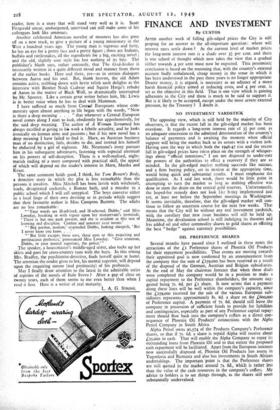FINANCE AND INVESTMENT
By CUSTOS
AFTER another week of falling gilt-edged prices the City is still groping for an answer to the all-important question: where will interest rates settle down ? At the current level of market prices the long-term interest rate is a shad: over 3f per cent. and there is one school of thought which now takes the view that a gradual slither towards 4 per cent must now be expected. This pessimistic conclusion is based on the reasoning that, with the country's external account badly unbalanced, cheap money in the sense in which it has been understood in the past three years is no longer appropriate: Dearer money, it is argued, is necessary as an adjunct of a more harsh financial policy aimed at reducing costs, and 4 per cent, is set as the objective in this field. That is one view which is gaining adherents in the City and there is much to be said to support it. But is it likely to be accepted, except under the most severe external pressure, by the Treasury ? I doubt it.
NO INVESTMENT YARDSTICK
The opposing view, which is still held by the majority of City observers, is that the recent fall in the gilt-edged market has been overdone. It regards a long-term interest rate of 31 per cent. as an adequate concession to the admitted deterioration of the country's balance of payments and is awaiting the moment when official support will bring the market back to its senses with a violent jerk. Having seen the way in which both the 1946-47 rise and the recent fall in gilt-edged prices have taken place on the strength of whisper- ings about "official intentions," I am not disposed to under-rate the powers of the authorities to effect a recovery if they are so minded. In the gilt-edged market nothing succeeds like succe4s, and a firm buying policy, set in motion at the appropriate time, would bring quick and substantial results. I must emphasise the qualification. As I said last week, there would be little point in attempting to turn the market so long as nothing effective was done to stem the drain on the central gold reserves. Unfortunately, the hoped-for remedy does not look 1.k: b:ing implemented just yet, at least not before the September meetings in Washington. It seems inevitable, therefore, that the gilt-edged market will con- tinue to follow an uncertain course for the next few weeks. That means that the City will be without any real investment yardstick, with the corollary that new issue business will still be held up. Meantime, the devaluation school is still indulging its theories and has added oil and other commodity shares to gold shares as offering the best "hedge" against currency possibilities.
OIL PREFERENCE SHARES
Several months have passed since I outlined in these notes the attractions of the LI Preference shares of Phoenix Oil Products for their repayment possibilities. That events are moving towards their appointed goal is now confirmed by an announcement from the company that the sum of £259,000 has been received as a result of the disposal of the German, Austrian and Belgian subsidiaries. At the end of May the chairman forecast that when these deals were completed the company would be in a position to make a capital repayment to the Preference shareholders, the amount sug- gested being 75. 64. per £i share. It now seems that a payment along these lines will be well within the company's capacity, since the £259,000 received for the sale of the various European sub- sidiaries represents approximately 8s. 64. a share on the L600,000 of Preference capital. A payment of 75. 64. should still leave the company in possession of sufficient funds to provide for liabilities and contingencies, especially as part of any Preference capital repay- ment should flow back into the company's coffers as a direct con- sequence of Phoenix Oil Products' connections with the Alpha Petrol Company in South Africa.
Alpha Petrol owns 91,574 of the Products Company's Preference shares, so that if 7s. 6d. a share is repaid Alpha will receive about £35,000 in cash. That will enable the Alpha Company to repay its outstanding loans from Phoenix Oil and to that extent the proposed cash repayment will be facilitated. Apart from the European interests now successfully disposed of, Phoenix Oil Products has assets in Yugoslavia and Rumania and also has investments in South African undertakings. The important point is that the Preference shares are still quoted in the market around 75. 64., which is rather less than the value of the cash resources in the company's coffers. My advice to holders is to see things through, as the shares still seem substantially undervalued.






























 Previous page
Previous page